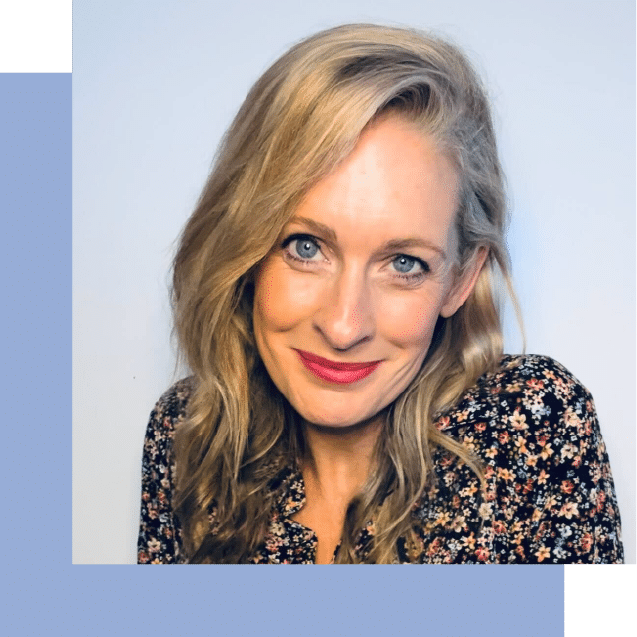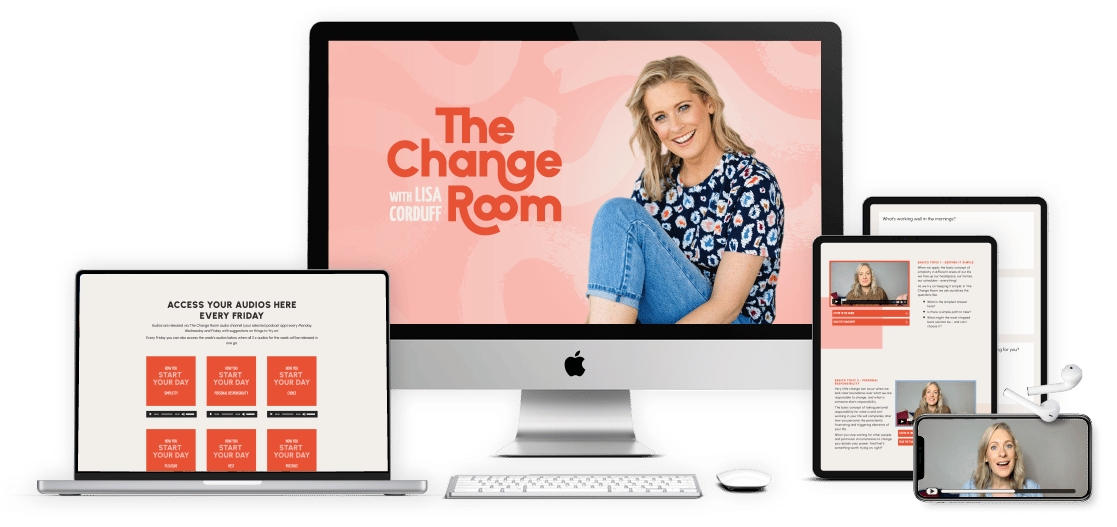

Never miss an episode! Subscribe and listen on iTunes, Stitcher or Spotify.
Who knew there was such a thing as OVER functioning? I mean – isn’t it ‘normal for life to feel all go-go-go and our role amongst that is to take care of all the things, all the people, all the time!?
It seems not. Listen to this episode and get a new perspective.
Lisa shares all the ways that she began recognising over-functioning and why she was driven to behave in this way (chronic fear that it would ‘all fall apart’ without her).
Hear the three gentle steps Lisa has taken to get off the over-functioning bandwagon and the surprising outcome of others rising around her as a result.
Links:
The doors to Momentum are open – a three-month container to help online business owners, coaches, freelancers, and creatives build intentional momentum to achieve their goals before the year ends! Watch the FREE Momentum Session Replay here!
Continue your conversation with Lisa:
Know someone who would love this episode?
Share it with them here (um, and a hefty handful of stars would be greatly appreciated!)
Prefer to read? Access the transcript here
Hi, it’s Lisa Corduff. Welcome to the podcast where you can expect inspiring, raw, energising, and transformative conversations with people on the path of personal evolution. I’m here to really live my life, and if you are, too, these conversations are just for you. I’m really glad you’re here. Enjoy.
Hey, welcome to another episode, the lessons so far. I’ve been getting such amazing responses from this series of episodes. So make sure if this is the first time you’ve come across me or something you’ve just jumped into, that you head back and check out the last few episodes and follow along to where I first started to, I guess, come across all of the lessons that I will be sharing with you. This one today is a biggie and there’s a few different aspects to it. I know that in all of my work with women in my programmes over the last eight years, that this is something that comes up all the time. I know I am not alone here because it’s something that you see spoken about all the time.
So in this episode, I’m going to talk to you a little bit about my propensity to overfunction and underfunction, but mostly overfunction in my private life; so what that means, how it manifests itself and how I knew I was, and then I guess I’m just going to leave you also with just three things that you can do if you recognise yourself in anything that I’m about to share and want to shift it. It’s literally a constant work in progress for me and I’ll share the ways in which I do that really simply. But, I guess, the way that you could describe overfunctioning is it’s like doing more than is necessary more than is appropriate and more than is healthy. That was the definition that I saw once: more than is necessary, more than is appropriate, and more than is healthy.
I read it and I was like, “Hmm, I wonder if the answer was yes, a resounding yes?” in so many ways. I think that’s the first part of this is going, “What is this whole overfunctioning thing and, all right, so too much. I can see that. But what’s the problem? If I don’t do the things, then everything falls down around me. If I don’t remind them of blah, blah, blah, then they won’t remember. If I don’t make the appointments, then who’s going to?” Ra-di-ra-ra-ra.
Here is something that I want to share with you when it comes to overfunctioning that now really I allow to drive my decision-making and is like my lighthouse here, is that I’ve moved from being the person who tried to keep everything under control, because it was a stress response, and I’ll talk about that in a second, to now sitting in that space of never wanting to do for others what they can do for themselves. Are you hearing me? Like, oh, yep, all of the parents are like, “But, but, but,” and I’ll share a bit about my kids. But the way that I kind of really started to see myself was that I was basically like a backseat or like really front seat drive up in other people’s lives. I was overfunctioning for the people around me. So that’s often what it looks like; that you overfunction for people. You know what that creates? Underfunctioning from the people around you.
So for all of those women who were like, “Well, I mean, the dishes just wouldn’t get done.” Wouldn’t they, or are you in a pattern of doing all the things and that’s created a kind of underfunctioning from the people around you? Believe me, I know you didn’t do it consciously. I know you weren’t like, “I know what I want to create. I want to create a situation where I have to do everything all the time because no one else is doing anything. That’s my ideal scenario.” You didn’t. Maybe it was that it was a pattern that you got into when maybe if you’re a parent and your kids were little and everything was just pooled really, really tightly and if you weren’t staying on top of everything, then things could very quickly fall apart. Because you were trying to hold all the balls in the air, you were trying to do it really well because you most likely have issues with perfectionism or high standards and so leaving it to anybody else just wouldn’t reach the same standard or things would get behind and your life didn’t have room for that.
So everyone around you was just watching you do all the things. They got used to it. It’s the way that you do stuff. For me, I’m going to give you some examples of what it might end up looking like or what it particularly ended up looking like in my life. But, for me, it was like, “If I am able to do this well, do that well, manage this, manage that, then I’ve got space for him and then he can just be whatever he needs to be and then he’ll be sober, everything will be okay. Just to hold it all together, Lisa, come on. Come on. There’s no room for you. There’s no room for you to fall apart here. There’s no room for you; like, literally, who else is going to do it? There’s no choice. It’s all on you. Come on. Let’s get doing it.”
So, I mean, even things like … If you only knew around here, I had started a blog where I was sharing whole food recipes. I got really, really interested in food, especially when it came to mental health. A lot of that was to do with trying to figure out how to help my husband who absolutely struggled with anxiety and depression early on in our marriage. I was like, “Oh my goodness, we could just cut out all of this and anxiety would disappear. He needs good gut function in order to be less stressed,” or whatever. “All of this stuff is to do with him eating too much of this or too much of this.”
So I suddenly, I loved learning about it for myself and, for sure, I was really, really into making sure my kids had their best start at life and so I was studying and I was learning and I was doing all the things, but I kind of like I made it my own personal mission to make everyone around me the healthiest that they could be. I know many, many food bloggers, whole foodies people who maybe had kids a little bit older than me when we were all going through that phase in … what was it like? I remember I studied to be a health coach in 2011. So my kids were really little and they’re like, “Okay, so my kid is doing things like sneaking to McDonald’s after school on the way home and then hiding the fact that they’re doing that.” Or, I just found a stack of lollies in their room. They know what’s healthy. They know what to do, and why are they …
But it was this overfunctioning. Like, “I know, I’ll control everything because my fear that they won’t be well is so great that I’m just going to put all of these checks and balances in place to make sure that everything, everyone’s healthy. Everyone’s good.” I tried to solve his problems myself. That was a pretty big task and I obviously didn’t achieve my end goal. But, oftentimes when we get into that overfunctioning, as I said before, it’s a result of something.
So for me, it was a result of stress and worry and feeling really, really out of control. So I would try to take control of what I could take control of. I would try to contribute in a way that felt meaningful and would give me some sort of ability to manage the anxiety that I was feeling inside myself. I was just, I thought, “Oh, if I just take care of everyone and everyone’s great, then I’ll be great.” That’s just not what happens. Because, as I said before, overfunctioning in someone creates an underfunctioning in someone else.
Can I just say, like, I am not an overfunctioner in every area of my life at all, and in our relationship there are absolutely ways in which I underfunctioned. A perfect example of that would be our finances. I just made it not my problem to understand where our money was, how it was being invested … very wisely I might add because Nick was super into that sort of thing … but paying bills, keeping on top of things, doing all that. I underfunctioned because he was so highly competent and really into that side of things. Just a side note for every single woman out there who may do the same thing, you never know what’s around the corner and I really, really encourage you to up your financial literacy and get involved in the financial side of your life. I had no idea. I didn’t even know certain bank accounts were there. I mean, thank God. I’m so grateful that Nick was so responsible with money and I was massively underfunctioning.
There were absolutely other areas of our life where that happened, too. But, anyway, that’s not … I just wanted to say that it’s that you can see how it happens. You can see how someone takes over and it’s like, “Oh, well, that’s good. That’s something I don’t have to worry about.” So that’s also how other people feel about you when you’re in your overfunctioning. So, I mean, I had set goals for our family. Nick was very good at setting individual goals and he would set goals for our family, but I was more focused on … Like there was just so much that I was focused on. I would make doctor’s appointments, chiro appointments, healer appointments. I mean, for him. I would constantly remind like, “Have you done this? Have you done that?” Like not leaving him any room to take responsibility for himself.
It was like a sign of also this hyper overfunctioning that I genuinely thought that I could, whilst raising like really little children in two days a week, build a business that would allow him to quit his well-paying engineering job just really quickly. Like I had unrealistic expectations of myself and what I could achieve because it was like, there was just this goal, there was this end that I was trying to work towards that in my mind was going to make everything better. So I absolutely … I mean, I threw myself under a bus for a couple of years just really trying so, so hard and not do like feeling a bit out of control with parenting, feeling out of control with the house, always running late, never really giving myself the chance to sink into and do something really well. That was absolutely me in my overfunctioning kind of state.
My work these days, I just have like very, very low tolerance for stress. I have a very low tolerance for stress in my life now, in general. Like it’s actually something that I notice and, of course, there’s periods of where things feel busier than other times and all that sort of thing. That’s like, that’s life. No problem. But it’s actually something I noticed now instead of being my default, and that’s the difference, right? I would limit what I would say around him, around close relationships, because I was always very conscious to whether speaking up or saying what was true for me was going to impact anyone badly. I lost my voice in a lot of areas of my life and I just became this person who was so on all the time. I literally didn’t feel like I had an off switch. It was just … and as I said, it can happen really without you noticing. But I was literally overfunctioning for my children and for my husband, in particular, and in some ways, in my work.
So when I was running courses and it was to help women just make small changes to what they were eating to really incorporate more whole foods into their life, I would obsess at … like, I would … I called them my small steppers … and I would obsess about my small steppers and why they weren’t taking the steps or what was happening with them, what I could be doing differently or better. Of course, that’s business improvement and you’re always looking to improve your customer’s experience and all, that’s the thing. But this was beyond that. I mean, ultimately, I had to recognise where my level of responsibility stopped and theirs began.
Like we can’t be responsible for other people and the choices that they’re making, but so many times, especially in our really close relationships, we take that responsibility on. There’s elements of overfunctioning, and if you listened last week to my episode about co-dependence, it kind of go a little bit hand in hand. But I think, for me, I didn’t want … we got to look at what’s driving this, like what was really at the core of it. For me, it was absolutely that sense that without me able to do the things, the things wouldn’t happen, and then that would lead to more chaos and I couldn’t cope with anything more. If I just knew it was done, if these things were happening and if I was tired and worn out, whatever, like the alternative didn’t feel okay either. But it was creating this vicious cycle. It was creating a cycle of kids who were not growing in their independence. Absolutely. It created enabling behaviours in my marriage and when you’re dealing with addiction, I wish I had seen all of this stuff a lot earlier.
Anyway, so here’s what I want. If you recognise yourself in this, here’s something that I want you to think about. These are the three ways in which I’m breaking this pattern and I’m talking about it like in present tense because I’m literally still working on this. So I started to, first of all, you have to just start to observe yourself. I observed myself, I started to see this overfunctioning happening. It was obviously happening in my marriage and with my kids, for sure. So in my family unit, how is this showing up? Like, I just started to observe myself when I first heard the term, when someone’s like, “I think you might be overfunctioning.” Okay, well, what would that mean? What did that …? Okay, yep, I can see that there, good times.
Then, secondly, I just started to get curious to what might be healthier for all of us. So when I’d find myself in like, “Oh, here you are,” and can I just say, anytime you feel resentment, just look there first. Like anything that you feel resentful about just even at home or in your work, look at that. I mean, it could be a number of different things, but sometimes it can be a sign that you’re jack of doing this particular thing or something being expected of you that you don’t want to do anymore. But it can feel really, really hard to change that pattern, right? Because it requires something from the people around you.
So once I’d be like, “Okay, you know what would actually feel good? It would actually feel good if I wasn’t the one who was responsible for thinking up each meal for the night.” Just something as simple as that. I was just like, “Why do I always have to think about what’s for dinner? I don’t want to do that anymore,” and I had done it because … it was like that because I was pretty obsessed with wanting everyone to have a really healthy meal and I thought, “Well, okay.”
The last thing is, is that then, once you’ve observed it, you’ve noticed it and then when you’re like, “Okay, what would we be better is if …” That’s a group discussion and I’m happy to go by the things still, but I don’t want to decide everything. So if a decision isn’t made about what’s for dinner, if I don’t get a response to a text or whatever, well then maybe there won’t be dinner, or maybe like he’ll have to put something together. But whatever it is, it’s about then being able to sit in the discomfort of allowing other people to be responsible for themselves.
So you guys, this week, I’m not doing the dishes after dinner, that’s on you. Then if it doesn’t happen, you need to sit in the discomfort of it not happening and allowing them to come to the party … it might be the next morning, it might be the next night, it might be whenever … to be responsible for themselves. Whoa, like for me, that meant something really, really huge. If I wasn’t going to be overfunctioning, if I wasn’t going to be bending over backwards, if I wasn’t going to be creating a whole life around Nick’s addiction, and every single expert tells you that they need to own the recovery. They need to decide. They need to care more than anybody else, because, ultimately, addiction is so powerful. It is just so ridiculously powerful that if they are … Like there’s literally nothing that you can do, even although you keep them trying and believing that, of course, there’s something you can do, they have to be the ones to be responsible.
So, ultimately, my overfunctioning led to him, me then choosing to have a healthier approach, which would be, “Okay, I love you, and I detach from the outcome of you choosing sobriety. That is so uncomfortable, but I have to not … I have to detach. I have to know that this is ultimately in your control. I love you, and this is yours now. I love you, and I have done everything and still the outcome isn’t what we want it to be. It has to be you now because it couldn’t keep going the way it was.” But that is a bloody hard thing to do, but there was actually no alternative because the choices, he would still make the same choices. It’s just like, well, whether I am creating a situation of almost even more enabling of that.
So, for me, beginning to recognise, observe, and then getting curious to a healthier outcome for everyone and then sitting in that discomfort of allowing other people to be responsible for themselves. I needed to actually then embrace asking for and receiving help because I couldn’t do it by myself anymore, all of it. I had to learn how to say no and disappoint people. I had to create actual boundaries. Not just like, “If this happens again …” It had to be real boundaries.
But just amongst loads of things. Boundaries. I had to learn how to communicate clearly, start tapping into what my needs might be, and I had to really acknowledge that this was being driven by a need to manage the chaos, but also because … I mean, I don’t think of myself as someone as having particularly high standards, but I absolutely had a story back then about failure, about what that would look like, and I was desperately trying to avoid it, do anything that I could to get that outcome, which I ultimately had no … Like, I couldn’t be responsible for it. I just often wonder if my overfunctioning contributed, not the other way around.
So boundaries are key. Being able to communicate, being able to look at where you feel resentful, what feels too much, actually just rationally communicating to the people around you. This needs to change. I don’t quite know how that’s going to work. I’d love your input. I’d love this to feel good to you too, but ultimately it might not. You’re going to have to get used to a new way and you can do that. You get to make different choices. If you found yourself in a state of overfunctioning for everybody around you, it’s actually not helpful to them. Think about, like I think about my kids all the time. It doesn’t help them for me to do everything, to be the martyr. Even in this lockdown like, “You guys, this is a lockdown of fun, but you’re the fun ones. You bring me the ideas. Let’s do this.”
Putting the onus back on them for things, getting them involved, giving them responsibilities for like not just little chores around the house or doing stuff like that. but you’re giving them the opportunity to make choices, to choose what they want to do, and then letting go and allowing, not trying to manage their lives to never feel disappointed or to never put them in situations where they might, in inverted commas, “fail” because I don’t think failure is real, or be hurt, or anything like that. It’s just such a different space to be in and, as I said, something that I’m literally learning as I go.
But I thought I’d share this particular learning because I know so many women struggle with it. We find ourselves in this spot where we’re like, “And so everyone else’s needs taken care of.” Feeling like if I was to disappear, this whole thing would fall apart. That’s not what we want. It’s actually not healthy for the people around you or for you, and we need to, those three things that I said, just start to gently observe yourself in your close relationships because that’s where you’ll see it. Then get curious to what might be a healthier option for everyone involved. Then you just got to sit in that juicy discomfort of allowing other people to rise and to be responsible for themselves, and being generous with them too. That it requires a change in them and most people don’t really appreciate change. So just being gentle with them and with your good self, as you learn new habits and new ways of being.
I’d be really curious to know if this resonated with you, and if you are, at all, someone who … There’s a lot of us in the entrepreneurial coaching or business community who are consistently going the extra mile, stepping outside their comfort zone, have big dreams, big visions, all of that sort of stuff. I cannot ever be someone now in my work … I mean, I’ve never resonated with the whole hustle and you just got to put in more hours and all of that stuff. I just absolutely don’t work like that. I think it’s totally possible to not overfunction in your work, but, in fact, be really well-supported to build and grow and have it feel like an expansive, adventurous journey instead of one of complete and total overwhelm.
I have been there, too. I have learned the lessons. Done it that way for awhile. So if you are one of the women in my community who is running her own thing, then you might be interested in a programme that I’ve just launched. It’s actually the chance to work with me and my team over the next three months, it’s called Momentum. I created it basically because I got a really great response when I shared with everyone I was getting way more intentional with my work in order to create momentum when, in 2021, it has felt really hard to do that in and out of snap lockdowns here in Melbourne, recovering from what was 2020, all of the things. We’ve opened up the doors. It’s a really intimate experience. If you are struggling to get into that momentum, if you want a place to talk strategy, if you want to actually be lifted up and be amongst people who feel the feels of everything that’s gone on this year, but we’ll be actively seeking to place their attention on what can be created, and will uplift you and anchor your weeks with our little momentum sessions on a Monday morning, then check out the details. We’ll put the link to this in the show notes. The doors are only open for a few days.
So if you aren’t one of these people, but you’re listening to the podcast and you know one of them, then let them know. I think what I want to do is help a group of women create more, be more visible, enjoy themselves more, take more care of themselves, sell more than they would have on their own. We need community right now. This is your chance to join us and actually finish off 2021 with a bang. I just totally know it’s possible.
Anyway, so that’s that from me. I hope you enjoyed this episode about overfunctioning. As always, if you have enjoyed this episode, take a screenshot and pop it in your stories and tag me. I love seeing your little takeaways that you get from these episodes. Anything you’d like to share back with me, I really hope you’re enjoying this series and I’ll see you in the next episode.
Hi. I just wanted to make sure that you had seen that I have a brand new opportunity for you to work with me over three months to finish 2021 with a bang. I know that it has been so hard to create and maintain momentum in your business in 2021. This year has given so many of us really significant challenges, and you know what I think we all need a little bit of? A little bit of focus, a little bit of a strategic mindset when it comes to how we’re using our time, and motivation and inspiration to make things happen. Don’t keep trying to do it on your own. Come and join me. There’s only limited spots. I would love to work with you and really help you make things happen before the end of the year. We can totally do that. Check out the show notes for details and don’t miss out. Bye.
Hey, if you’re enjoying the conversation, then it would mean the world to me if you head over to iTunes and give us a rating and review. It really makes a difference, and it’s my intention to get as many of us involved in real conversations that really change the game as possible. Thanks so much for your help and I’ll see you in the next episode.
Hey! I'm Lisa

Thousands of women have transformed their lives using my programs and workshops.
Whether you’re seeking a quick shift or a full deep dive (with the transformation to match), you’ll find tools and training that can help, right here...

FREE Energy WORKBOOK
Get the simple, powerful workbook that can take you from tired and depleted to having your energy back. Even if life is really busy, you’ve got no time,And you’re not sure where to start

THE CHANGE ROOM
IT ALL STARTS WITH THE CHANGE ROOM.
You’ve changed, I’ve changed and it’s time to upgrade. Fun. Unpretentious. Easy. I can’t wait to welcome you inside The Change Room.
...WHAT ARE YOU WAITING FOR?

